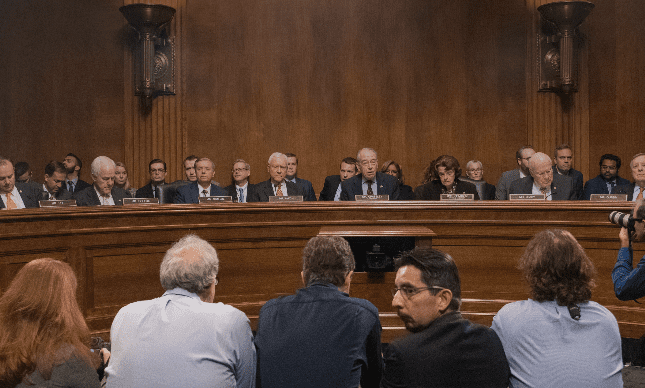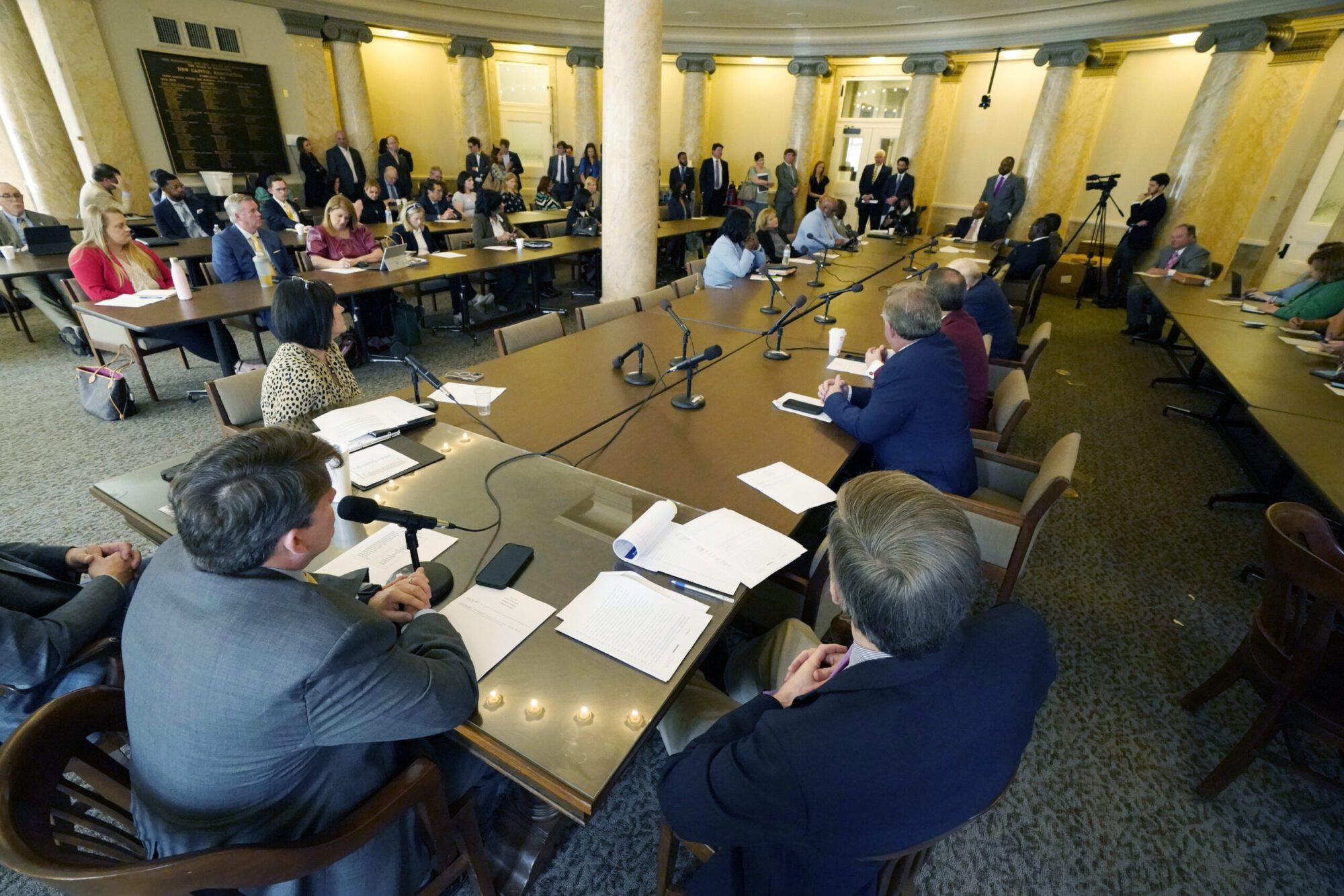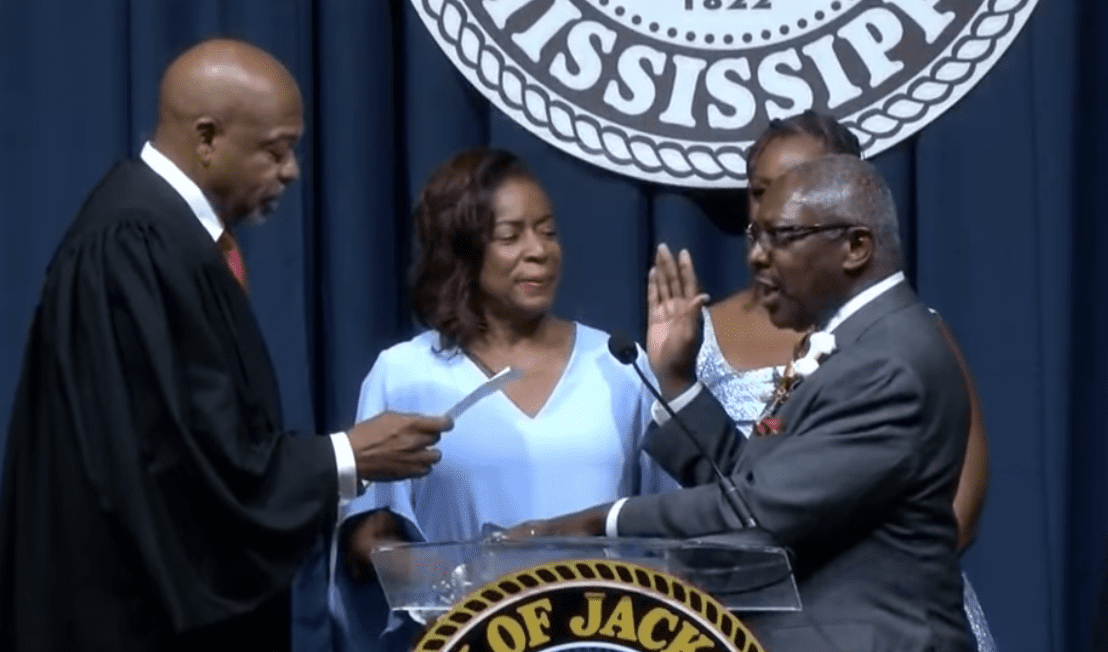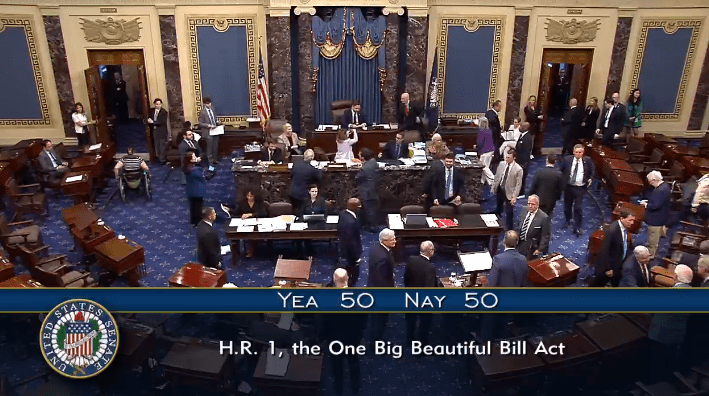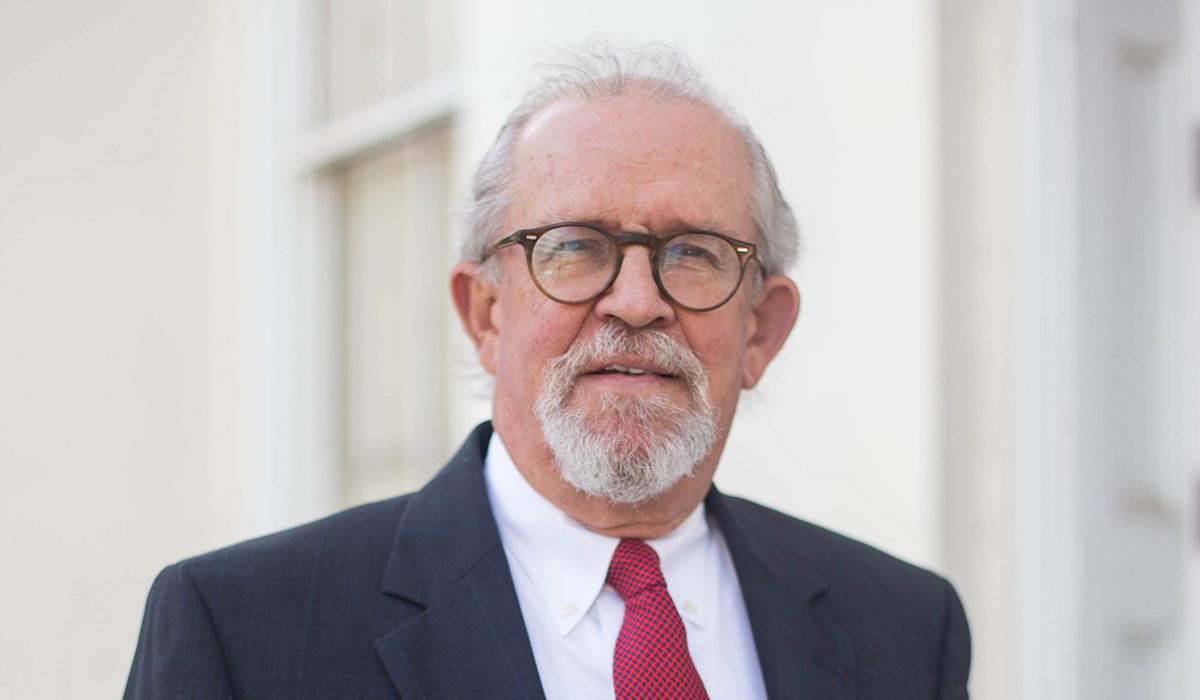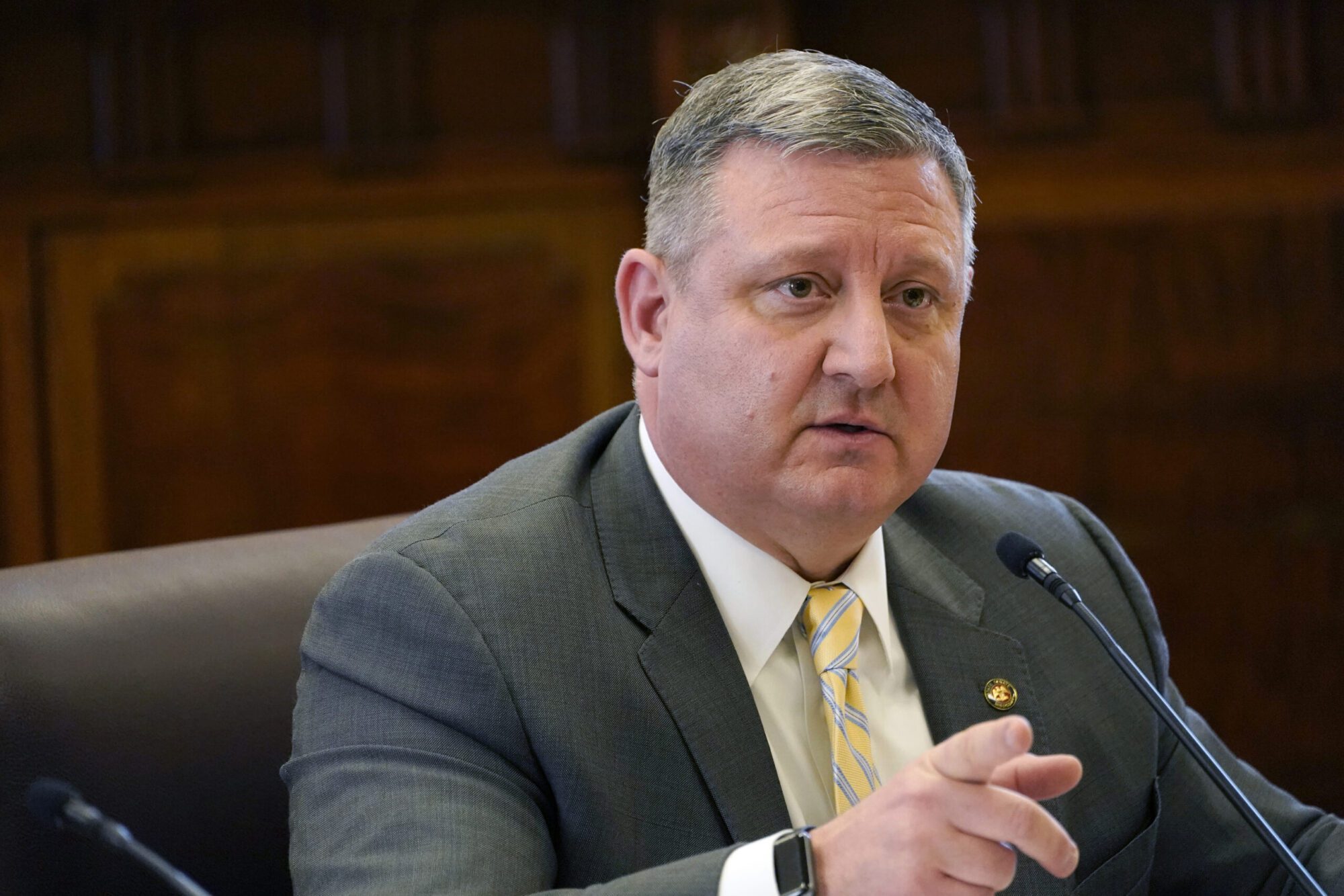
Senate Education Committee Chairman Dennis DeBar Jr., R-Leakesville, Tuesday, March 1, 2022. (AP Photo/Rogelio V. Solis - Copyright 2022 The Associated Press. All rights reserved.)
Student enrollment, rather than average daily attendance, could soon be used to provide state funding to local school districts.
On Tuesday, the Mississippi Senate Education Committee passed House Bill 1369 with a proposed amendment, sending it to the full Senate for consideration.
The bill previously passed the House in a near unanimous vote in early February, receiving 116 yeas and no nays with four absent or not voting.
HB 1369 would adjust the Mississippi Adequate Education Program (MAEP) funding formula so that funding is based on actual student enrollment rather than average attendance.
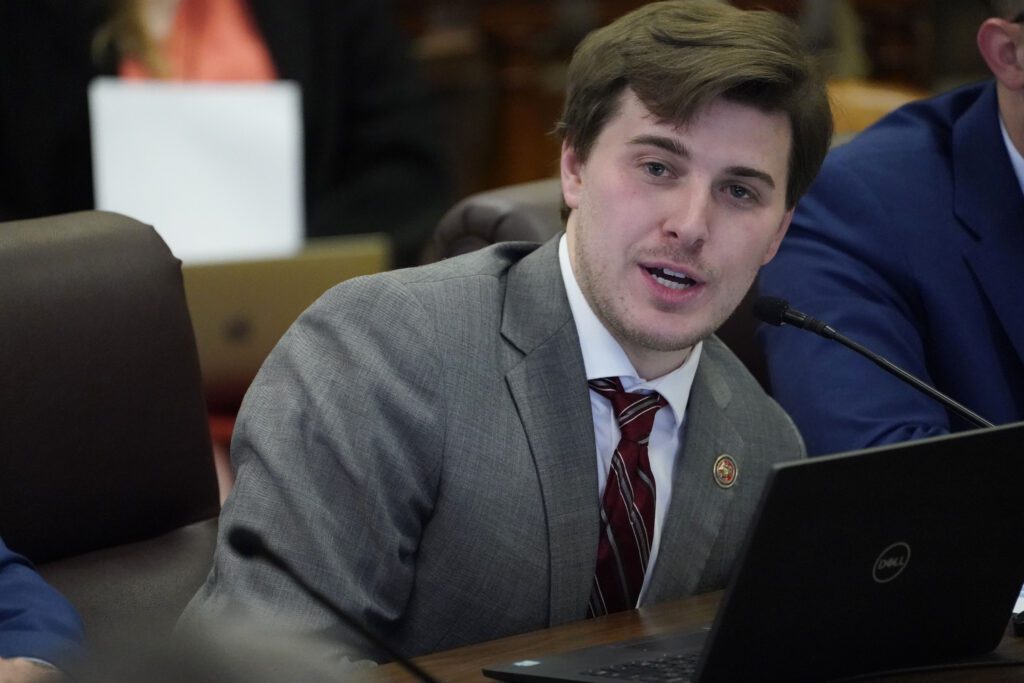
State Representative Kent McCarty (R), the author of the legislation, said this much-needed change will provide “a more reliable stream of funding for our schools.”
When taken up in the Senate Education Committee, lawmakers expressed that their intent is to try and fully fund MAEP with changes to the formula aimed at making it more sustainable.
“What we’re bringing in the code sections forward, as you’re aware, we’ve had a goal of fully funding MAEP,” State Senator Dennis DeBar (R) said. “Every year we’ve been in this term, basically we’ve had a plan from the very beginning to institute teacher pay raises which we’ve done, and now we’re at the point where we have money to potentially fully fund MAEP.”
The Senate Education Chairman said that for the twelve years he has been in the Legislature, he has heard people on both sides of the aisle talk about how there’s changes in the formula that could be made to improve its sustainability. He added that the ability to fully fund MAEP becomes more possible in the years to come.
“And so, we’re bringing forward these code sections with the goal in mind to make some minor, technical changes to the MAEP formula itself and with those changes the goal is to fully fund MAEP this year,” Senator DeBar said. “And this is our vehicle to make it happen.”
DeBar said the Senate Education Committee has done some heavy lifting over the last four years. He added that those efforts will hopefully result in the ability to fully fund MAEP at the end of this session.
Senator Brice Wiggins (R) said the state needs to get to the point where MAEP is fully funded. However, that funding remains subject to available annual state revenues as it will cost the state over $2 billion.
“Thinking down the road, there will no doubt be a time where we don’t have the money we have now,” Senator Wiggins said. “And I guarantee you, when that year comes, it may be two years from now, it may be three years from now, and we fully fund it this year, which is fine, we’re going to be beat up and articles are going to be written and articles are going to be told to us how in that year, we’re not fully funding MAEP.”
Senator Wiggins said lawmakers know how the appropriations process works. While he thinks it’s a goal they need to achieve, Wiggins wanted to go on the record now before the “education community” and the “liberal media” beat them up in the future.
“So, when the education community and when the liberal media starts beating up on us that we didn’t fully fund MAEP, the reality is we got money because of the decisions being made and one-time money,” Wiggins said. “I know a lot of people have worked on the MAEP formula and it’s a good goal to reach, but the appropriations process is what it is, and it will only work with the money that you have available.”
Education lobbyists, such as The Parents Campaign, have largely aligned with the Democratic minority in the Legislature on the issue since Republicans gained the majority in both chambers 12 years ago. The groups routinely point to MAEP’s funding formula as being something school districts are “owed” and the majority refuses to pass. Such rhetoric has traditionally gained more steam during election years, like this one.
But MAEP was implemented in 1997 under a Democratic majority Legislature. Since then, it has only been “fully funded” twice.
However, the Republican-led Legislature has made significant and unprecedented investments into education along with strategic policy changes that has been proven to have markedly raised most every key education metric, from reading on grade level to the highest graduation rates in state history, since gaining the majority in 2012.
New State Superintendent Dr. Robert Taylor recently outlined the increased outcomes over the past decade.
“In 2019, Mississippi achieved the No. 1 spot in the nation for gains on the National Assessment of Educational Progress (NAEP) when 4th grade students made the largest score gains from 2017 to 2019 in reading and mathematics. In 2022, we maintained our historic gains in NAEP 4th grade reading, while scores nationally dropped in all four NAEP subjects and grades,” Dr. Taylor said. “Because of these achievements, more than 20 states have contacted Mississippi to learn about our effective policies and strategies to improve student outcomes.”

Other achievements over the past decade include reaching an all-time high graduation rate of 88.9%, improving the state’s overall Quality Counts grade from an F to a C- (the nation’s grade is a C), and moving the state’s national ranking for NAEP 4th grade reading scores up from 50th to 21st.
“These achievements are not only historic, they are life changing for students,” Dr. Taylor said.
When asked about what the increased MAEP funding would mean for Mississippi children and public schools, State Superintendent Taylor said school districts in low-wealth communities do not have the tax base to provide enough local funds to cover all the costs of operating their districts.
“Adequate funding would help districts with the greatest need to best serve their students,” Dr. Taylor said.
Senator DeBar said this legislation and the tweaks for MAEP with full funding in mind isn’t something that has just “come up overnight,” adding that those who have been working on it have had many discussions with people on both sides of the aisle. He noted that as they go forward with the technical amendment, if a situation arises where there are cuts, all would understand.
Senator Wiggins asked Chairman DeBar whether the intent of moving these code sections forward was to make tweaks that gets lawmakers to a point where every year MAEP can be fully funded. Senator DeBar said, “Yes.”
“For four years now the education community has trusted this committee to do the right thing and I think at some point this committee has to trust the education community that they will then not beat us up when the state takes a downturn in the future,” said Senator DeBar said.
DeBar hopes that the changes being suggested will keep lawmakers from having to makes cuts in the future.
Senator Wiggins also pointed out the need for local school districts to “max out local millage,” saying that there are areas around the state who refuse to put their taxes at fully funding MAEP at the local level. He believes that is unfair and lends to the inequities when compared to those districts and counties who do fully invest in education at the local level.
Senator Briggs Hopson (R), the Senate Appropriations Chairman, offered one additional consideration related to language. He said Average Daily Membership, as proposed in the original legislation, doesn’t really reflect if students are in the classroom. He said he hoped to see terminology changes to better clarify that intent, suggesting Average Daily Enrollment instead.
MAEP is a legislatively crafted formula set by state law to determine the funding each public school district could receive from the state in order to meet academic standards established by the State Board of Education based on attendance. While increases have been made to both classroom funding and teacher pay over the last decade, “fully funding” MAEP has not been on the table when lawmakers considered annual appropriations due, in large part, to the enormity of the budget line and the ability to balance needs across other budget lines.
You can watch the Senate Education Committee meeting below.
